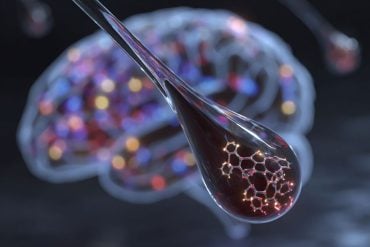Summary: Study demonstrates a molecular mechanism that contributes to the development of PTSD. The findings could lead to therapeutic interventions for preventing or treating the disorder.
Source: CAMH
Research led by the Centre for Addiction and Mental Health (CAMH) published in the Journal of Clinical Investigation points to a groundbreaking discovery about a new potential treatment and prevention for post-traumatic stress disorder (PTSD).
The research team, led by Dr. Fang Liu, Senior Scientist and Head of Molecular Neuroscience in CAMH’s Campbell Family Mental Health Research Institute, and Professor and Co-director of Division of Neuroscience and Clinical Translation, Department of Psychiatry at the University of Toronto, recently identified a protein complex that is elevated in PTSD patients. The researchers also developed a peptide to target and disrupt the protein complex. They found that the peptide prevented recall or encoding of fear memories in early tests. This suggests that the peptide could treat PTSD symptoms or prevent them entirely.
“The discovery of the Glucocorticoid Receptor-FKBP51 protein complex provides a new understanding of molecular mechanisms underlying PTSD,” said Dr. Liu. “We believe this protein complex normally increases after severe stress, but in most cases, levels soon go back to baseline levels. However, in those who develop PTSD, the protein complex remains persistently elevated, and so this could be a blood-based biomarker for PTSD as well as being a target for pharmacological treatment. In addition, the peptide we developed could be given after a traumatic event, and could possibly prevent the patient from developing PTSD. This is a completely new approach to PTSD and for psychiatric disorders in general.”

PTSD occurs in some people after experiencing or witnessing traumatic events, such as sexual assault or military combat. Patients can suffer from debilitating flashbacks, nightmares and anxiety which can severely impact quality of life. There are currently no laboratory diagnostic tests for PTSD, and existing treatments have limited efficacy. According to a recent study published in the British Journal of Psychiatry, Canada has the highest prevalence of PTSD among 24 examined countries, and 9.2 per cent of Canadians will develop PTSD in their lifetimes.
“We are thrilled this CAMH-led discovery can potentially help millions of people put trauma behind them,” added Dr. Liu.
The study has been supported by CIHR and the CAMH Discovery Fund. CAMH has filed a patent for the peptide and diagnostic aspect of Dr. Liu’s invention. Dr. Liu and her team will conduct further testing and refining of the peptide before conducting human clinical trials.
Source:
CAMH
Media Contacts:
Sean O’Malley – CAMH
Image Source:
The image is in the public domain.
Original Research: Open access
“The glucocorticoid receptor–FKBP51 complex contributes to fear conditioning and posttraumatic stress disorder”. Haiyin Li, Ping Su, Terence K.Y. Lai, Anlong Jiang, Jing Liu, Dongxu Zhai, Charlie T.G. Campbell, Frankie H.F. Lee, WeiDong Yong, Suvercha Pasricha, Shupeng Li, Albert H.C. Wong, Kerry J. Ressler, Fang Liu.
Journal of Clinical Investigation doi:10.1172/JCI130363.
Abstract
The glucocorticoid receptor–FKBP51 complex contributes to fear conditioning and posttraumatic stress disorder
Posttraumatic stress disorder (PTSD) can develop after exposure to severe psychological trauma, leaving patients with disabling anxiety, nightmares, and flashbacks. Current treatments are only partially effective, and development of better treatments is hampered by limited knowledge of molecular mechanisms underlying PTSD. We have discovered that the glucocorticoid receptor (GR) and FK506 binding protein 51 (FKBP51) form a protein complex that is elevated in PTSD patients compared with unaffected control subjects, subjects exposed to trauma without PTSD, and patients with major depressive disorder (MDD). The GR-FKBP51 complex is also elevated in fear-conditioned mice, an aversive learning paradigm that models some aspects of PTSD. Both PTSD patients and fear-conditioned mice had decreased GR phosphorylation, decreased nuclear GR, and lower expression of 14-3-3ε, a gene regulated by GR. We created a peptide that disrupts GR-FKBP51 binding and reverses behavioral and molecular changes induced by fear conditioning. This peptide reduces freezing time and increases GR phosphorylation, GR-FKBP52 binding, GR nuclear translocation, and 14-3-3ε expression in fear-conditioned mice. These experiments demonstrate a molecular mechanism contributing to PTSD and suggest that the GR-FKBP51 complex may be a diagnostic biomarker and a potential therapeutic target for preventing or treating PTSD.







